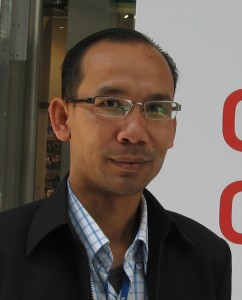
Posted on 13 October 2012 by json
By Kunda Dixit
TOKYO, Oct 13 (TerraViva) – After a decade of progress, it had seemed that the world was on target to meet many of the Millennium Development Goals (MDGs) that were set in 2000 to halve extreme poverty and hunger, boost health and literacy in 15 years. Continue Reading

Posted on 12 October 2012 by json
Mak Chamroeun, president of Khmer Youth Association, is the lone activist from Cambodia at the IMF-WB Annual Meetings in Tokyo, Japan. He chats with IPS Asia-Pacific TerraViva’s Sam Rith about what he learned from the meetings.
TerraViva: What have you learned from these meetings?
Mak: What I learned most relates to the youth, the shortage jobs for youth that the leaders of IMF and World Bank are very interested in. I found that there are a lot of joblessness among the youth, and that there will be more cooperation to resolve the economic crisis, youth issues, and joblessness. I have listened to different guest speakers in different seminars during the IMF-World Bank meetings talk about how to resolve the joblessness of the youth. They said that SMEs play very important role (in this). I found out that the leaders of IMF and World Bank showed high commitment not (only to) reduce the poverty, but to end poverty.
TerraViva: What are the challenges that Cambodian youth face today?
Mak: Cambodian youth now are facing illiteracy, lack of education, lack of skills that the market requires. Not many of our youths now participate in implementing political, democracy, human rights and local governance. We have about 8 million youths, about 60 to 65 percent of the population. We do not have parliamentarians aged below 35. Each year, thousands of students graduate from schools and colleges but there is no working opportunity in their local areas. The other issue is that the poverty limits them from being able to get education, health treatment and other services. Drugs are still a problem.
TerraViva: Cambodia has been receiving a lot of aid from developed countries, World Bank, IMF and others after the civil war. How important will aid continue to be for the country?
Mak: We still need aid from outside because the government has not yet managed effectively to raise internal resources including natural resources, human resources and others.

Posted on 11 October 2012 by elainehuang
World Bank President Jim Yong Kim probably knew at the Wall Street Journal’s ‘The Big Interview’ at the WB-IMF Annual Meetings in Tokyo on Thursday that he would have to field some tough questions. Continue Reading

Posted on 10 October 2012 by json
TOKYO, Oct 10 – Transparency plays very important role in transforming a country’s resource wealth into other assets that support sustained development, said panelists at a discussion during the IMF-World Bank Annual Meetings here.
“It is a very good idea if you get new revenue to be transparent from the very beginning,” said Clare Short, chair of the UK-based Extractive Industries Transparency Initiative.
She explained that it is important to inform the public about this from the start, before a government approves any company’s investment in any natural resource, so that people know what the contract is, what the taxation arrangement is, what the company saying to the states, how much it damages the environment and so forth.
The discussion on Wednesday afternoon was held against the backdrop of how resource-rich developing countries can transform their resource wealth into other assets that support sustainable development, while avoiding the boom-bust cycles that stem from volatility in natural resource revenues.
Maria Kiwanuka, Uganda’s minister of finance planning and economic development, agreed that before companies are to extract and use any natural resource, this should be informed to the public and voted through the parliament system. “So the people and the parliamentarians know how much (revenue) is going into infrastructure spending, going into investment…,” she added. (Sam Rith)











